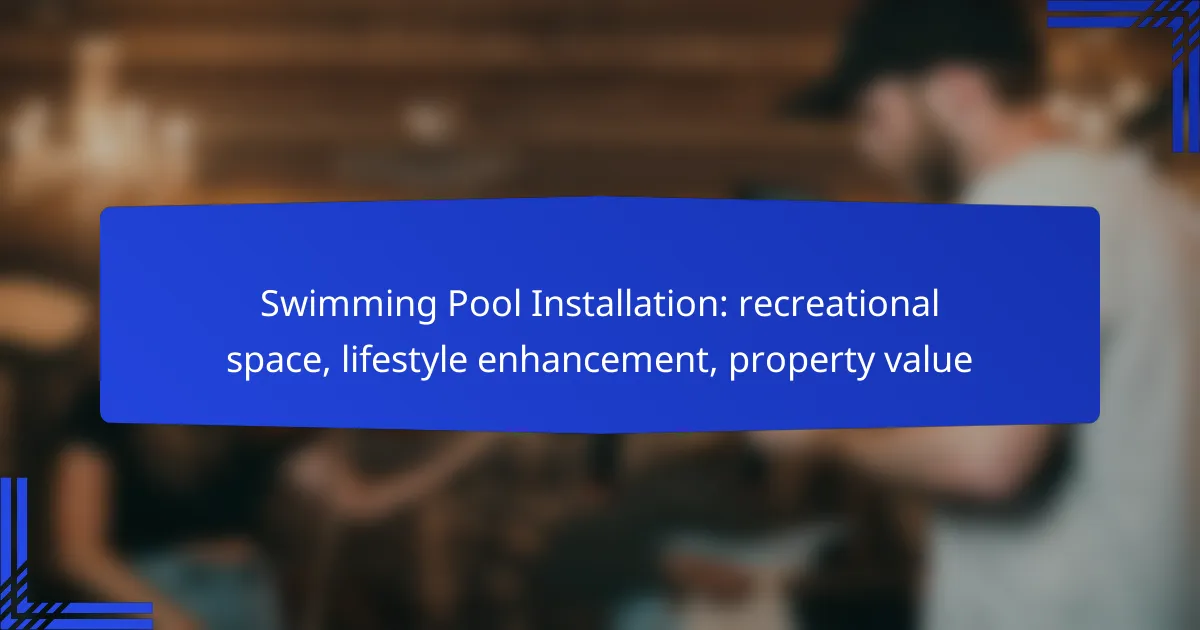Installing a swimming pool is a transformative investment that enhances lifestyle by creating a versatile recreational space for relaxation, fitness, and social gatherings. Beyond the immediate enjoyment it offers, a well-designed pool can significantly increase property value, making it a smart choice for homeowners looking to elevate their outdoor living experience.

How does swimming pool installation enhance lifestyle in the UK?
Swimming pool installation significantly enhances lifestyle in the UK by providing a versatile recreational space that promotes relaxation and enjoyment at home. It transforms outdoor areas into vibrant hubs for leisure, socializing, and fitness, ultimately improving overall quality of life.
Increased outdoor recreation
Having a swimming pool encourages more outdoor activities, allowing families to enjoy warm summer days without leaving home. It serves as a central point for various recreational pursuits, such as swimming, sunbathing, and hosting pool parties.
Consider installing features like a poolside deck or a barbecue area to maximize the recreational potential. These additions can further enhance the outdoor experience, making it an inviting space for family and friends.
Improved family bonding
A swimming pool can strengthen family relationships by providing a shared space for fun and relaxation. Engaging in activities like swimming games or poolside barbecues fosters communication and togetherness among family members.
Regular pool time can become a cherished family tradition, encouraging everyone to disconnect from screens and spend quality time together. This shared experience can create lasting memories and deepen family connections.
Health and fitness benefits
Swimming is an excellent form of exercise that promotes cardiovascular health, muscle strength, and flexibility. Installing a pool makes it convenient to incorporate regular swimming into your fitness routine, benefiting all family members.
Additionally, the low-impact nature of swimming makes it suitable for individuals of all ages and fitness levels. Consider setting fitness goals, such as swimming a certain number of laps each week, to stay motivated and track progress.

What are the key benefits of installing a swimming pool?
Installing a swimming pool offers numerous advantages, including lifestyle enhancement, recreational opportunities, and increased property value. Homeowners can enjoy a personal oasis while also making a smart investment in their property.
Increased property value
A swimming pool can significantly boost your property’s market value, often appealing to potential buyers. In many regions, homes with pools can sell for tens of percent more than comparable homes without one.
When considering installation, research local real estate trends to understand how much value a pool might add in your area. Factors such as climate, neighborhood, and pool type can influence this increase.
Enhanced aesthetic appeal
Beyond functionality, a swimming pool enhances the visual appeal of your outdoor space. A well-designed pool can serve as a stunning focal point, complementing landscaping and outdoor living areas.
Consider incorporating features like lighting, waterfalls, or surrounding decks to elevate the aesthetic experience. These enhancements not only improve the look but also create a more inviting atmosphere for gatherings and relaxation.
Energy-efficient options
Modern swimming pools come with energy-efficient options that can reduce operational costs. Features like variable-speed pumps, solar heating, and LED lighting can help minimize energy consumption while maintaining comfort and usability.
When selecting equipment, look for ENERGY STAR-rated products that meet efficiency standards. Investing in these options can lead to savings on utility bills and a smaller environmental footprint over time.

What are the costs associated with swimming pool installation in the UK?
The costs of swimming pool installation in the UK can vary significantly based on factors such as pool type, size, and additional features. Homeowners should expect to invest a substantial amount, typically ranging from tens of thousands to over a hundred thousand pounds, depending on their choices.
Average installation costs
The average installation costs for a swimming pool in the UK generally fall between £20,000 and £70,000. In-ground pools tend to be more expensive than above-ground options, with additional expenses for landscaping, decking, and fencing. Custom features like heating systems or waterfalls can further increase the total cost.
When budgeting, consider obtaining quotes from multiple contractors to ensure competitive pricing. It’s also wise to factor in potential planning permission fees if your installation requires it.
Ongoing maintenance expenses
Ongoing maintenance expenses for a swimming pool can range from £1,000 to £3,000 annually, depending on the pool size and type. Regular costs include water treatment, cleaning supplies, and utilities for heating and filtration systems. Hiring a professional service can add to these expenses but may save time and ensure proper upkeep.
Homeowners should also budget for occasional repairs and equipment replacement, which can arise as the pool ages. Setting aside a maintenance fund can help manage these costs effectively.
Financing options available
Several financing options are available for swimming pool installation in the UK, including personal loans, home equity loans, and specialized pool financing. Personal loans can be a quick way to secure funds, while home equity loans may offer lower interest rates since they are secured against your property.
Additionally, some pool companies may offer financing plans or partnerships with financial institutions. It’s essential to compare interest rates and terms to find the most suitable option for your budget and financial situation.

What steps are involved in swimming pool installation?
Swimming pool installation involves several key steps, including site assessment, design planning, and construction phases. Each stage is crucial for ensuring a successful and compliant installation that enhances your recreational space and property value.
Site assessment
The site assessment is the first step in the swimming pool installation process. This involves evaluating the land where the pool will be installed, considering factors like soil type, drainage, and proximity to utilities. A professional assessment can help identify potential challenges and ensure compliance with local regulations.
During this phase, it’s also essential to check for any zoning restrictions or permits required in your area. Understanding these regulations can prevent costly delays later in the project.
Design planning
Design planning focuses on creating a blueprint for your swimming pool that meets your aesthetic and functional needs. This includes selecting the pool shape, size, and materials, as well as considering landscaping and surrounding features. Collaborating with a designer can help you visualize the final outcome and make informed decisions.
It’s important to factor in your budget during this phase. Pool designs can vary widely in cost, so establishing a clear budget can guide your choices and avoid overspending.
Construction phases
The construction phases involve the actual building of the pool, which typically includes excavation, installation of plumbing and electrical systems, and the pool shell construction. Each of these steps requires skilled labor and adherence to safety standards to ensure a durable and safe pool.
After the pool structure is in place, finishing touches like tiling, decking, and landscaping are added. This phase can take several weeks to complete, depending on the complexity of the design and local weather conditions. Regular communication with your contractor can help keep the project on track and address any issues that arise promptly.

What factors should be considered when choosing a swimming pool type?
When selecting a swimming pool type, consider factors like installation cost, maintenance requirements, and available space. Each pool type offers unique benefits and drawbacks that can impact your recreational experience and property value.
In-ground vs above-ground pools
In-ground pools are permanently installed and typically offer a more luxurious appearance, but they come with higher costs and require more extensive maintenance. Above-ground pools are generally more affordable and easier to install, making them a popular choice for budget-conscious homeowners.
Consider your long-term plans when choosing between these options. If you plan to stay in your home for many years, an in-ground pool may enhance your property value more significantly than an above-ground option.
Material options: fiberglass, vinyl, concrete
The choice of material for your pool affects durability, maintenance, and aesthetics. Fiberglass pools are quick to install and require less maintenance, while vinyl pools offer a softer feel and lower initial costs but may need liner replacements over time. Concrete pools are highly customizable but involve higher upfront costs and ongoing maintenance.
Evaluate your lifestyle and budget when selecting a material. For example, if you want a low-maintenance option, fiberglass might be the best choice, while concrete could be ideal for those seeking a personalized design.
Size and shape considerations
When deciding on the size and shape of your pool, think about how you plan to use it. Larger pools are better for families or entertaining, while smaller pools can fit into tighter spaces and still provide enjoyment. Common shapes include rectangular, oval, and freeform, each offering different aesthetic and functional benefits.
Measure your available space and consider local zoning regulations, which may dictate pool size and placement. A well-planned pool can enhance your outdoor area and increase your property’s appeal.

What are the regulations for swimming pool installation in the UK?
In the UK, swimming pool installation is subject to various regulations that ensure safety and compliance with local laws. Homeowners must navigate building permits, safety standards, and local council guidelines before proceeding with any installation.
Building permits required
Before installing a swimming pool, you typically need to obtain a building permit from your local council. This process involves submitting plans that detail the pool’s design, location, and construction methods. It’s crucial to check with your council, as requirements can vary significantly across different regions.
In some cases, smaller pools may be exempt from needing a permit, but it’s advisable to confirm this with local authorities to avoid potential fines or enforcement actions.
Safety regulations and fencing
Safety regulations in the UK mandate that all swimming pools must be adequately fenced to prevent accidental drownings, especially for children. The fencing should be at least 1.2 meters high and have a self-closing gate that locks automatically.
Additionally, pool owners should consider installing safety covers and alarms to enhance security. Regular maintenance checks on these safety features are essential to ensure they function correctly.
Local council guidelines
Local councils may have specific guidelines regarding the installation of swimming pools, including restrictions on the pool’s size, depth, and placement within your property. It’s important to consult your council’s planning department for any zoning laws that may apply.
Some councils may also require an environmental impact assessment, particularly if the pool installation could affect local wildlife or drainage systems. Understanding these guidelines early in the planning process can save time and resources.
